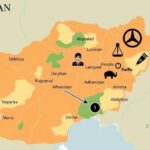Conflicts
Politics
ABDUL AZIZ HAQQANI, ABDUL MATEEN QANI, ADAM BOEHLER, AFGHANISTAN, AMIR KHAN MUTTAQI, ASIA, FOREIGN TERRORIST ORGANIZATION, GEORGE GLEZMANN, HA, HAQQANI, INTERNATIONAL RELATIONS, KABUL, MIDDLE EAST, MILITARY, NATO, NORTH AMERICA, SECURITY, SIR, SIRAJUDDIN HAQQANI, TALIBAN, TERRORISM, TRUMP, UNITED STATES, US, US STATE DEPARTMENT, YA, YAHYA HAQQANI, ZA, ZALMAY KHALILZAD
Omar El-Sharif
US Rescinds Bounties on Key Leaders of the Haqqani Network
The United States has removed bounties on key members of the Haqqani network, which includes Taliban interior minister Sirajuddin Haqqani. This decision follows recent diplomatic engagements between US officials and the Taliban aimed at securing the release of an American tourist. The lifting of bounties indicates improving relations and highlights the growing power of the Haqqani network within the Taliban government.
The United States has rescinded previously imposed bounties on significant figures in the Haqqani militant network, including its leader Sirajuddin Haqqani, who also serves as the Taliban government’s interior minister. This notable decision follows the Taliban’s assumption of governance in Afghanistan after foreign troop withdrawal in 2021, promoting the Haqqani network’s integral role in the current administration.
The bounties were lifted shortly after US officials engaged in talks with the Taliban in Kabul regarding the release of an American tourist detained since 2022. A spokesperson for the US State Department confirmed that there are currently no rewards for the Haqqani members, although they maintain their designation as Specially Designated Global Terrorists.
The FBI’s webpage reflecting a $10 million bounty on Sirajuddin Haqqani has been updated to indicate its removal. Taliban spokesman Abdul Mateen Qani expressed that the withdrawal of the bounties signifies positive diplomatic efforts and enhanced relations with the United States, aspiring for increased trust and interaction.
Recently, a US delegation participated in negotiations with Taliban officials, resulting in the release of American national George Glezmann. The origins of the Haqqani network date back to the 1980s, initially supported by the CIA, but it has since transformed into one of the most influential militant groups in the region, historically aligned with the Taliban, particularly since their rise to power in 1996.
Currently, Sirajuddin Haqqani is rising as a prominent figure within the Taliban administration, especially as tensions surface regarding women’s educational rights between him and Taliban leader Mullah Hibatullah Akhundzada. The Haqqani network has attempted to appear more moderate, drawing support from those dissatisfied with the current leadership’s stance on women’s education.
In summary, the US has lifted bounties on key Haqqani leaders, signaling a shift in diplomatic relations with the Taliban. This decision underscores the growing influence of the Haqqani network within the Taliban government, particularly in the context of ongoing tensions regarding women’s educational rights. The recent negotiations leading to the release of a detained American further illustrate the evolving interactions between the US and the Taliban administration.
Original Source: www.bbc.com







Post Comment